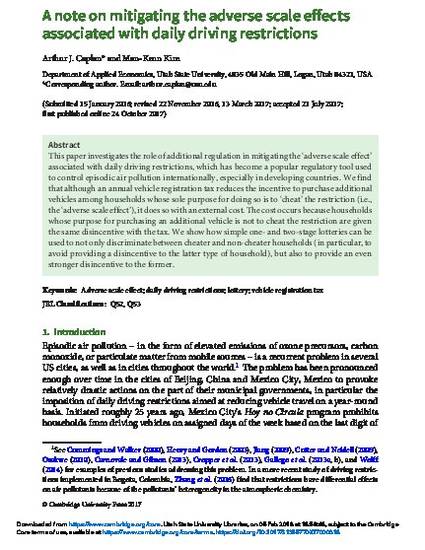
Article
A note on mitigating the adverse scale effects associated with daily driving restrictions
Environment and Development Economics
(2018)
Abstract
This paper investigates the role of additional regulation in mitigating the ‘adverse scale effect’
associated with daily driving restrictions, which has become a popular regulatory tool used
to control episodic air pollution internationally, especially in developing countries. We find
that although an annual vehicle registration tax reduces the incentive to purchase additional
vehicles among households whose sole purpose for doing so is to ‘cheat’ the restriction (i.e.,
the ‘adverse scale effect’), it does so with an external cost. The cost occurs because households
whose purpose for purchasing an additional vehicle is not to cheat the restriction are given
the same disincentive with the tax. We show how simple one- and two-stage lotteries can be
used to not only discriminate between cheater and non-cheater households (in particular, to
avoid providing a disincentive to the latter type of household), but also to provide an even
stronger disincentive to the former.
Keywords
- adverse scale effect,
- daily driving restrictions,
- lottery,
- vehicle registration tax
Disciplines
Publication Date
Winter February 15, 2018
DOI
10.1017/S1355770X17000316
Citation Information
Arthur Caplan and Man-Keun Kim. "A note on mitigating the adverse scale effects associated with daily driving restrictions" Environment and Development Economics Vol. 23 Iss. 1 (2018) p. 63 - 79 Available at: http://works.bepress.com/arthur_caplan/126/
